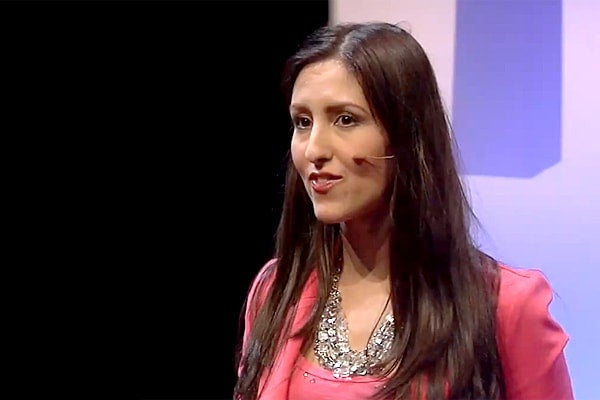
Student finalist in TED Talks’ 2013 talent search
Published: July 16, 2012
With just a few words, Padina Pezeshki captivated her audience: "Here's a woman suffering from advanced breast cancer," she said simply, "the kind that has spread to her bones. The kind that has fractured her spine."
But Pezeshki, a PhD candidate at the University of Toronto's Institute of Biomaterials & Biomedical Engineering (IBBME), painted a picture of hope and survival through a novel therapy that may significantly alter the course of cancer that has spread to bone.
That presentation earned Pezeshki a trip to Vancouver to participate in the Canadian finals of TED Talks’ 2013 Talent Search, which is focused on the theme: "The Young. The Wise. The Undiscovered."
TED Talks are an extremely popular non-profit series of online presentations geared towards spreading new and innovative ideas. TED staged presentations in 14 cities around the world, including Vancouver.
Pezeshki, who co-invented a commercially-available spine device that earned three patents, discussed her PhD research involving advances in radio frequency technology used to treat bone cancer. You can watch her presentation here.
"It's a totally different pressure [than giving an academic presentation] because of the scope and context and potential for what it can do," said Pezeshki of the TED Talks stage.
Although radio frequency therapies have been in use for some time, the problems associated with this technology — not reaching the entire tumor or damaging surrounding healthy tissue — have been persistent issues. What's so novel about Pezeshki's technique?
"Its success in the tissue being targeted," Pezeshki described.
The technology Pezeshki has been working with — a collaborative project involving the University of Toronto, the Orthopaedic Biomechanics Lab at the Sunnybrook Research Institute and Baylis Medical Company — has incorporated several nuances into its design that make it more effective than similar conventional technology. The resulting device delivers a much more controlled and consistent application of radio frequency energy that targets cancer tissue more effectively, so much so that researchers have recently begun clinical trials of the device in the U.S. and Canada.
"All of the pre-clinical trials, testing, validating and optimizing the device on test subjects have been part of my PhD project," Pezeshki explained. "My PhD project results led to FDA approval for these clinical trials."
Pezeshki’s advancement in the TED Talks competition will be determined through online voting currently underway. The number of clicks and comments each presenter receives will be used by organizers to determine which candidates are included in next year's line-up.
"It was my secret birthday gift to myself," said Pezeshki of her application, which involved a CV and a one-minute video. "The deadline was my birthday and I didn’t tell anyone I applied."
"This was a great opportunity for Padina to present her work to a large audience and motivate other young women in bioengineering and biomedical research," said Professor Cari Whyne from the Department of Surgery and cross-appointed to IBBME, who is co-supervising Pezeshki's research.
"Padina’s enthusiasm is reflected in her work in the lab and her dedication to the science and engineering of RF (Radio Frequency) ablation for cancer spread to bone."
While she's in the limelight now, celebrity isn't a career option for Pezeshki. Although a self-proclaimed TED Talks fan, her passion lies in the biomedical engineering field and translational sciences. Several people came up to her after her presentation to tell her stories of loved ones lost to cancer, something she hopes her research might subsequently change.
"This is my motivation," she said. "I hope I become useful to the world."



